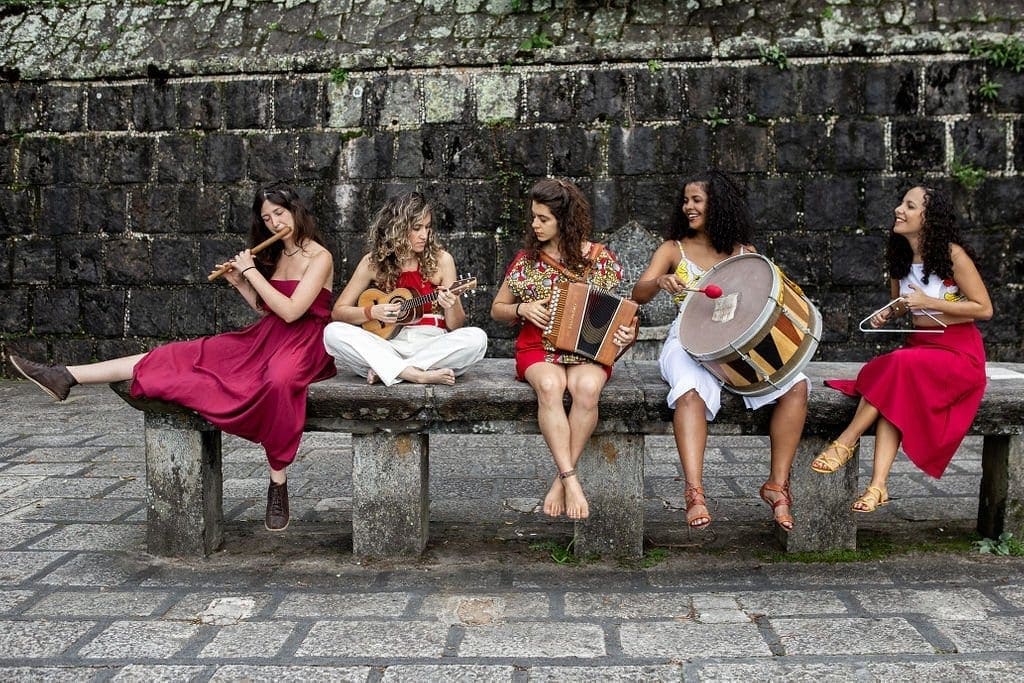Samba, forró… In Brazilian music, women have often been relegated to the role of singers and dancers. But all-women groups have formed in recent years and been forced to contend with Brazil’s cultural machismo.
“We are women of all colours, all ages and many loves (…) All Brazilian women grow up oppressed by the patriarchy. But times have changed. Now it’s my body, my rules”.
The audience picks up the chorus from the eight female musicians and singers in the samba group. Most of them are women; their right hands on their hearts, left fists in the air and a broad smile on their lips. The Samba Que Elas Querem (in English “The Samba Women Want”) group’s cover of the song by Martinho da Vila is now as popular as the original.
Despite forming just two years ago, the group from Rio has already toured in Portugal and released a single.
Samba Que Elas Querem - Nos somos mulheres:
The stage needs to be conquered
Seven years ago, the group Moça Prosa, formed by six black women, was one of the first groups of female musicians to break through in Rio.
“We were always being tested”, remembers Luana Rodrigues, a percussionist in the group. “Sometimes men in the audience would come and tap us on the shoulder to ask us to get up so they could take our place. Like they wanted to show us how to play”. They admit to having got up at the start. “We didn’t really get it”, recognises Ana Priscila da Silva, another percussionist in the group. “We didn’t understand that it was discrimination, machismo”.
A machismo that takes many forms: at the beginning, when they were asked to play, organisers would check that they were up to playing non-stop for four hours. Their attitude is scrutinised whenever they play. They have already been criticised for not smiling enough during their concerts. “Would people ever say that about an all-male group?” wonders Ana Priscila. “We’re often criticised for details… We don’t have the right to make mistakes”.
Moça Prosa - Somos Todas Marias:
Similar accounts are heard in other types of Brazilian music. The group Forrózinas is made up of five musicians who play forró, a popular style of music from Brazil’s north east.
As women, they feel that they are sometimes not taken seriously: “The mixing deck was something we had to win over”, explains Marcela Coelho, a musician in the group. She has noticed that sound technicians often fail to take their comments into account. “They won’t let us touch it”, she says with indignation. “Sometimes, they come over when I’m making adjustments and completely take over. They think that because I’m a woman I don’t have the technical skills to adjust my own sound”.
Long-standing machismo
As in forró, women in samba have more often than not played a secondary role. But despite being undervalued, they were crucial to the birth of this musical genre. Starting with Tia Ciata, one of samba’s many “tatas”. A cook, she opened up her home to host samba parties at a time when the musical genre was banned. Machismo was such that women could not put their own names to their compositions. This was a case of Dona Ivone, for example, who would put male pseudonyms to her music.
For this new generation of female musicians, changing mindsets begins with changing lyrics. A long tradition of chauvinistic and misogynistic lyrics that sometimes incite violence. “There are songs we don’t sing”, says Cecilia Cruz, who plays the cavaco in the group Samba Que Elas Querem. She quotes a passage from “Faixa Amarela” by Zeca Pagodinho: “If she falters / I’ll punish her / Give her a good slap / Break five teeth and four ribs”. But awareness of this culture of machismo, present in the lyrics despite joyful melodies, isn’t always clear. “We grow up listening to this music,” stresses Marcela. “Often, we sing it, but then when we stop for a few seconds to think about it we realise”.
When they are on the stage, they feel that they have an important political role. “We become messengers”, Marcela hopes. “We can’t reproduce this type of violence that isn’t just machismo but also often homophobic or racist!” The Forrózinas admit to feeling free in their music: “We’ve even done a swimsuit video, but it was absolutely not sexual”, laughs Milena Pastorelli, the group’s accordionist.
Forrozinas - Chiclete Com Banana:
Sisterhood
Female musicians talk about their hopes for their careers as if there was a battle to be won. And for good reason; as yet very few of them are able to make a living from their art. This tough start has motivated them to stick together. “Whenever we hear that stand-in musicians are needed, we always suggest women first,” explains Luana Rodrigues.
In the big cities of south-east Brazil (Rio, São Paulo, Belo Horizonte), groups of female musicians are becoming more and more numerous. Júlia Ribeiro, a percussionist with Samba Que Elas Querem, recalls the importance of transmission during concerts: “We want to reach as many women as possible who will hear our message and say ‘Why not us?’ and start taking up more space”. Proud of having already inspired several groups in just a year since they formed, the Forrózinas are keeping all their options open. “We already see ourselves on tour in Europe and the north-east of Brazil”, says Milena Pastorelli.


